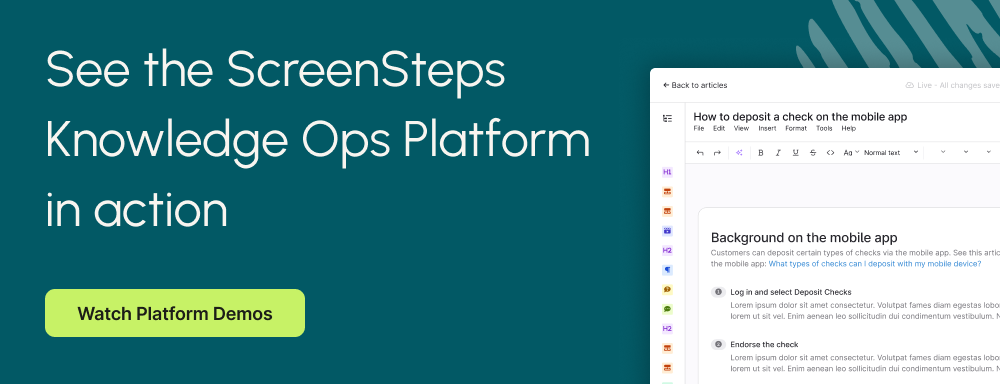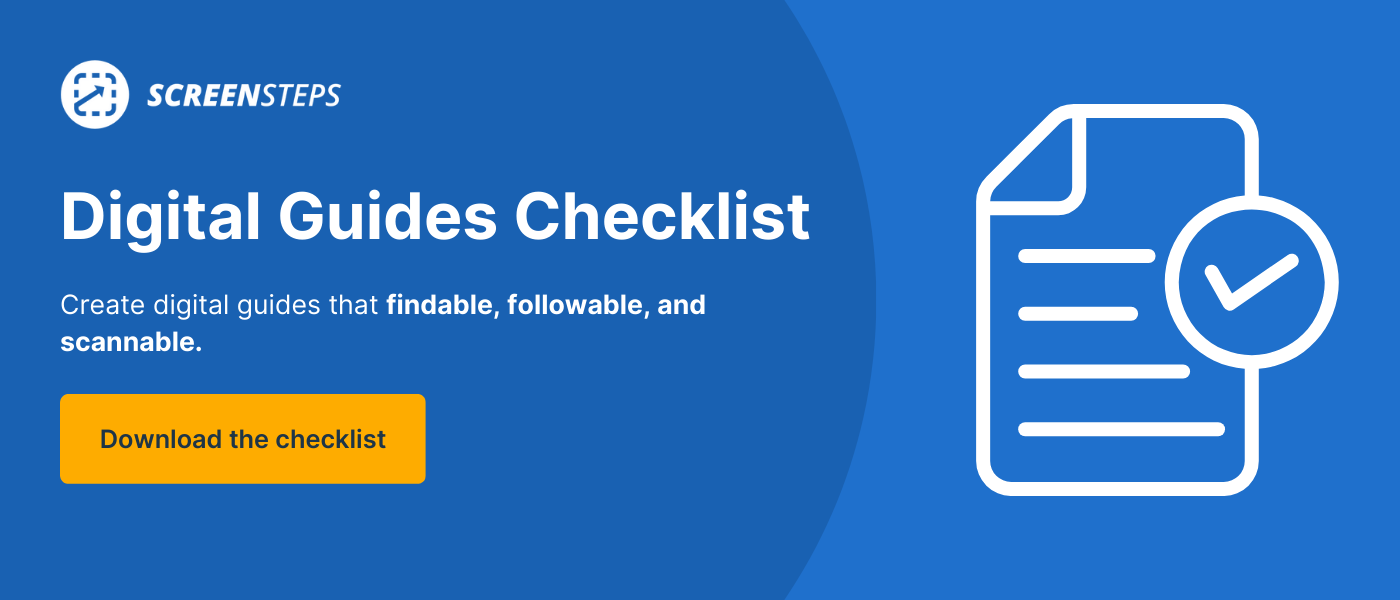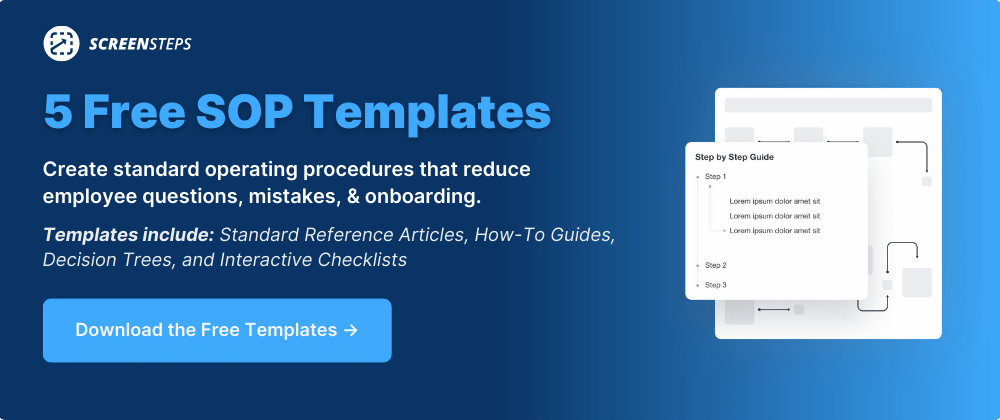12+ SOP Examples + Free Templates to Start Writing SOPs
Starting your standard operating procedures (SOPs) from scratch is a daunting task.
Luckily, you don’t have to start from scratch. If you’re looking to document more of your company’s policies and procedures, you’ve come to the right place.
Working for ScreenSteps — a knowledge ops solution that helps your business capture and share SOPs — I understand how critical documenting your company procedures is.
So, how do you start documenting your SOPs? Where should you get started?
Here are 12 examples of common SOPs. Use these examples to guide you. They cover a variety of different situations and industries. Then download the free SOP templates here to start documenting your standard operating procedures today.
➡️ JUMP TO SOP EXAMPLES ⬅️
What is a standard operating procedure?
A standard operating procedure (SOP) is a set of documented instructions that guide employees on how to handle different job situations. It is a standard to perform a task.
The purpose of an SOP is to clarify appropriate approaches to your work and maintain consistency throughout a business.
Often, SOPs are step-by-step guides that take an employee through an entire process, like a recipe or a cross-stitching pattern. But an SOP doesn’t have to be a how-to article.
Usable vs unusable: What makes a good SOP?
There are a lot of SOP templates on the internet — and not all of those templates are good. In fact, there are a lot of templates and examples that will lead you in the wrong direction.
Look at this side-by-side comparison of an SOP.
Usable SOPs
The "usable" example is focused on relaying information that the end-user needs as quickly as possible. In this case, it is relaying the steps for depositing a check on a mobile app. See the example below.
Notice how there’s a spot for background information, but it’s very minimal — just enough to give the reader context so they can know if they’re in the right place.
Unusable SOP example
With the unusable example, which reflects a commonly used template for SOPs, you have to scroll through the first several pages before you even get to the information you need. It includes a lot of information at the top that might be useful for the technical writer and document manager, but it’s not very helpful to the end-user who needs to reference the procedure regularly.
Once you scroll down to page 3, you finally get to a procedure. But it’s either written as a narrative and difficult to follow, or it’s too general and missing important details. See this example below.
In either case, a first-time reader would need to ask somebody for help because it’s not entirely clear what needs to be done (and how it should be done).
3 main roles of an SOP
The main purpose of an SOP is to transfer knowledge as fast as possible for a particular task.
What is the most efficient way that you can transfer knowledge? Do you need a Ph.D. to translate this SOP before you can do anything?
A good SOP fulfills these three main roles. For actionable SOPs, you need to:
- Clearly communicate what is being done
- Clearly communicate the main tasks and steps to take
- Simply explain and show how to do those steps and tasks
The goal of an SOP is to help you clearly understand what information is being presented and enable your employees to take action.
5 types of standard operating procedures (+ examples)
There are five main types of SOPs that companies create.
While companies create dozens and even hundreds of different templates for SOPs, all of those SOPs come back to these five standard operating procedures.
1. Checklist
A checklist is a simple way to communicate your instructions, especially for experienced workers. Checklists fulfill your basic SOP criteria where you need to complete a select set of tasks.
Your checklist prompts employees on what to do. It serves as a reminder of what steps to take and in what order to perform those steps.
Below is an example of a checklist article that explains how to print a check at a bank.
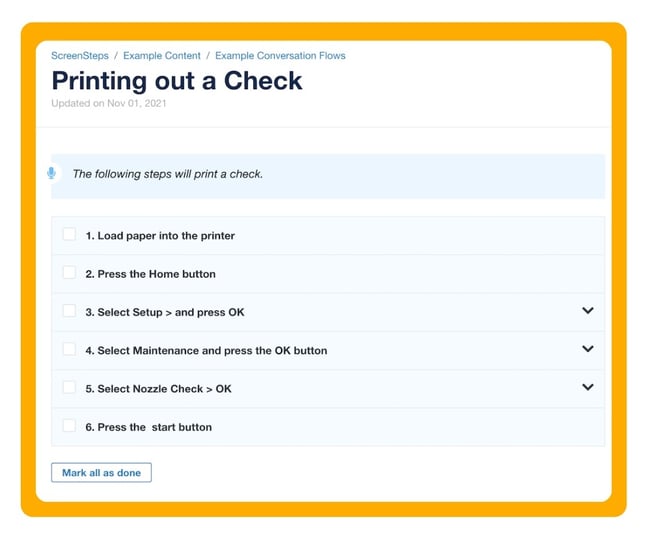 Note: This SOP example was created in ScreenSteps, but the principles of writing your SOP still apply.
Note: This SOP example was created in ScreenSteps, but the principles of writing your SOP still apply.
2. Decision tree
A decision tree is an SOP that guides a user through a decision. It asks a series of questions. Each answer leads to a new question until the task is handled.
Decision trees are especially helpful with complex procedures, like troubleshooting, that have a lot of different outcomes.
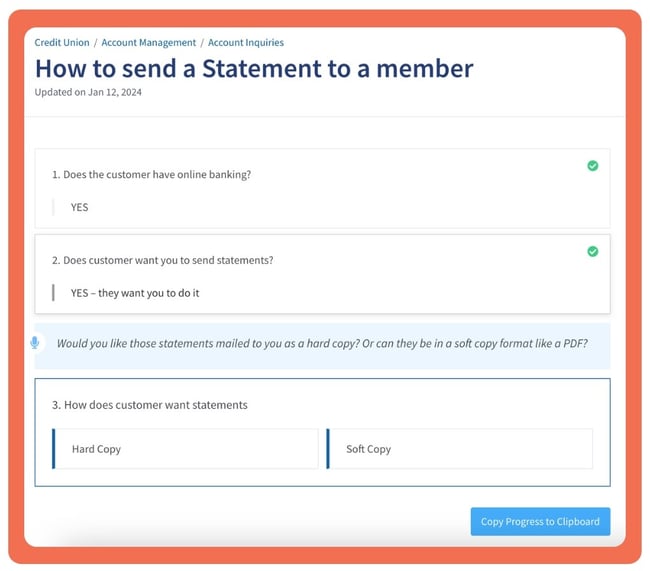 Note: This SOP example was created in ScreenSteps, but the principles of writing your SOP still apply.
Note: This SOP example was created in ScreenSteps, but the principles of writing your SOP still apply.
3. How-to
A how-to SOP is what people often refer to as work instructions. The how-to article provides click-by-click instructions on how to complete a task.
This is a workflow and works as if someone were sitting beside the employee, instructing them on what to do for each step.
Notice how this how-to SOP example primarily uses screenshots. It uses minimal words. Instead, it focuses on quickly communicating what needs to be done.
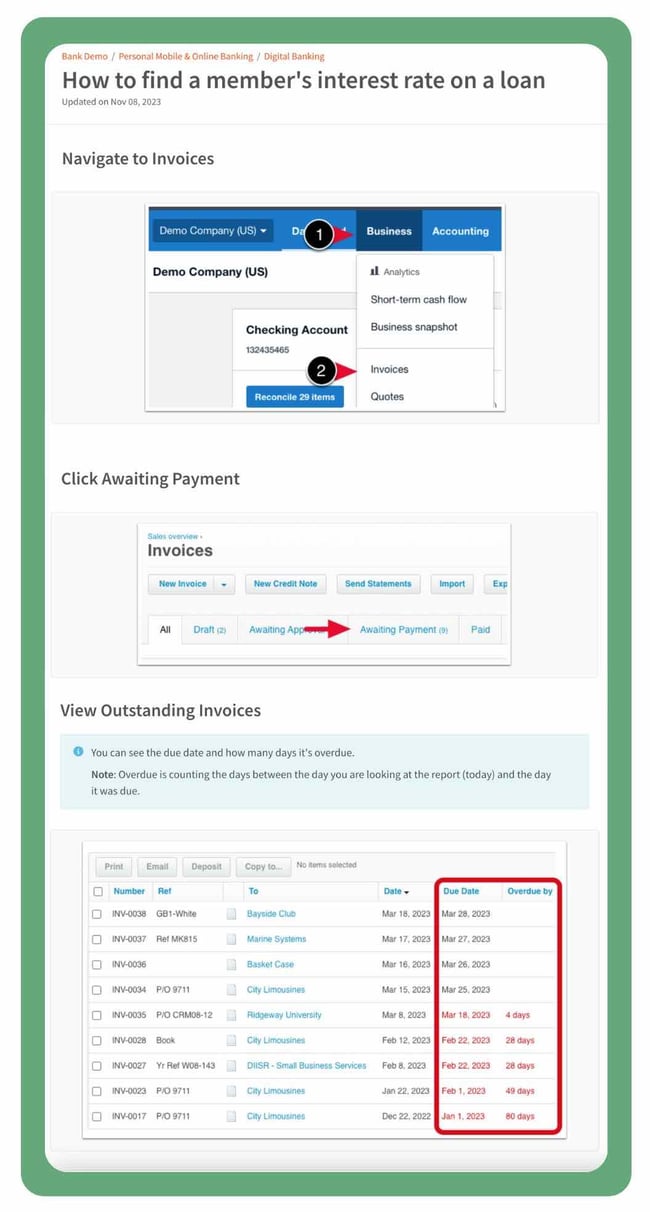 Note: This SOP example was created in ScreenSteps, but the principles of writing your SOP still apply.
Note: This SOP example was created in ScreenSteps, but the principles of writing your SOP still apply.
4. Reference guide (or quick reference guide)
A quick reference guide (QRG) is often associated with a job aid. This is a document where employees can quickly access simple information, like what hours different offices are open or deadlines to file a claim.
These are often charts or tables that make it easy for someone to skim and gather the information they need.
In this example, a user can quickly scan the columns to understand the different types of checks they can deposit on a mobile device.
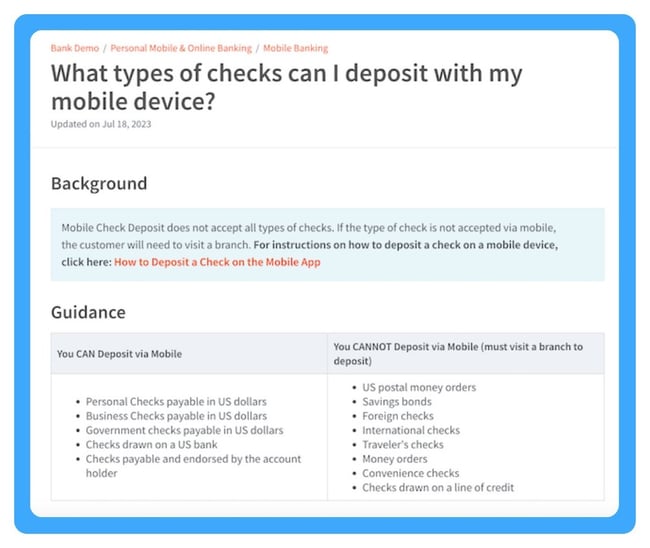 Note: This SOP example was created in ScreenSteps, but the principles of writing your SOP still apply.
Note: This SOP example was created in ScreenSteps, but the principles of writing your SOP still apply.
5. Foundational article
A foundational article is an uncommon SOP. A foundational article explains the background context to help people understand your SOPs.
Often, companies will stuff their foundational SOPs into the same articles as how-to guides, checklists, etc. Then their SOPs become crowded and less user-friendly.
That’s why we recommend breaking articles up into smaller articles — including foundational articles — and then linking the articles together.
This foundational knowledge SOP shows the difference between a Roth IRA and a traditional IRA.
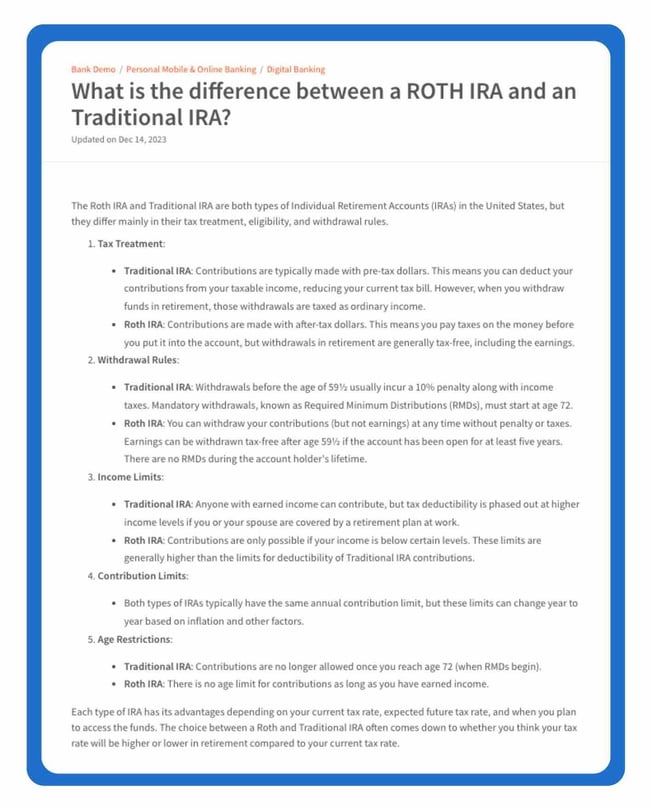
Note: This SOP example was created in ScreenSteps, but the principles of writing your SOP still apply no matter where you document your SOPs.
7 examples of SOPs for businesses
With the five examples above, you have a good baseline for any SOP you create. But to help out a bit more, here are seven more examples. These examples include a few industry and department-specific SOPs.
1. Standard operating procedure example
This SOP example shows your basic workflow article. A workflow article is a decision tree that has interactive technology, such as a knowledge base or a knowledge ops platform.
With this example, it starts out as a decision tree. Then the procedure ends as a how-to article with the how-to information.
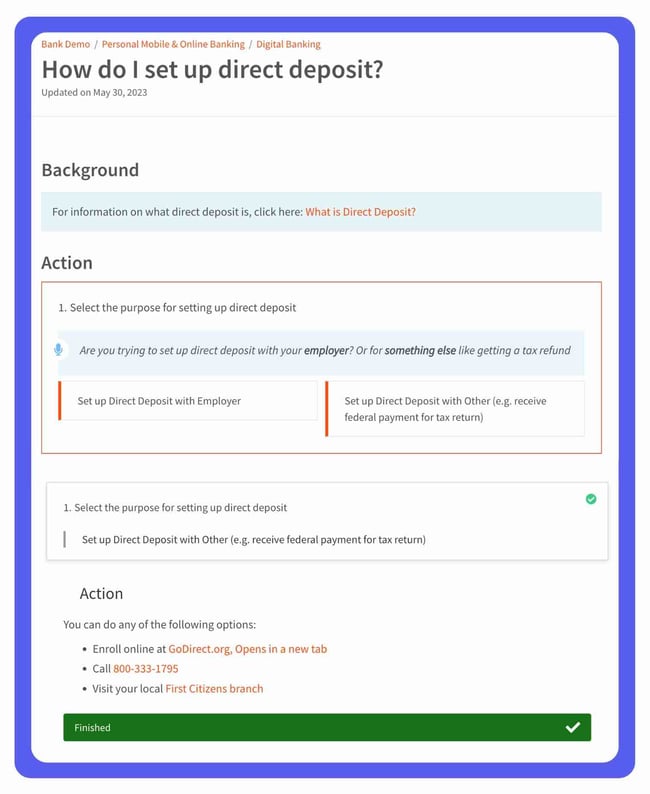 Note: This checklist article was created in ScreenSteps, but the principles of writing your SOP still apply.
Note: This checklist article was created in ScreenSteps, but the principles of writing your SOP still apply.
2. HR SOP example
Your human resource department deals with a lot of SOPs. They are in charge of onboarding new hires. They oversee compliance in your company. And, let's not forget, they are the ones who handle your vacation requests.
Here's an HR SOP example of how you can request time off. This SOP example is a how-to SOP.
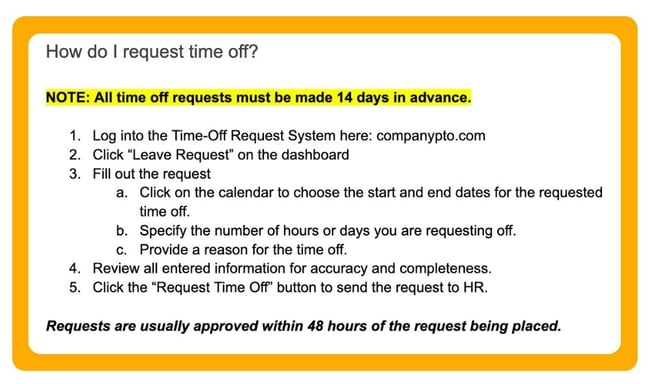 Note: This example was created in Google Docs.
Note: This example was created in Google Docs.
3. Business (sales) SOP example
Your sales team has many procedures they handle as they acquire new customers for your company.
They have procedures for reaching out to prospective customers and procedures to hand off new customers to your teammates handling customer onboarding.
Here are two examples of sales SOP resources. The first example is a checklist for how to qualify a lead.
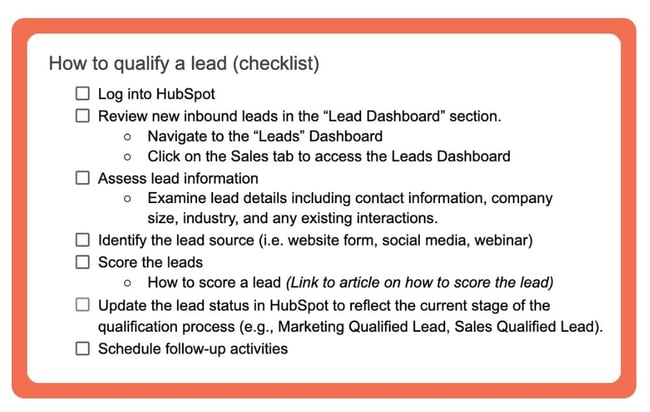 Note: This example was created in Google Docs.
Note: This example was created in Google Docs.
The second example is a quick reference guide. These reference guides are helpful for your sales team to have at their fingertips. Then they can quickly pull up accurate sales information while they are on a call.
This example is for an internet company. This is a simple table to remind the salesperson of the basic contract information, including the cost and length of the contract.
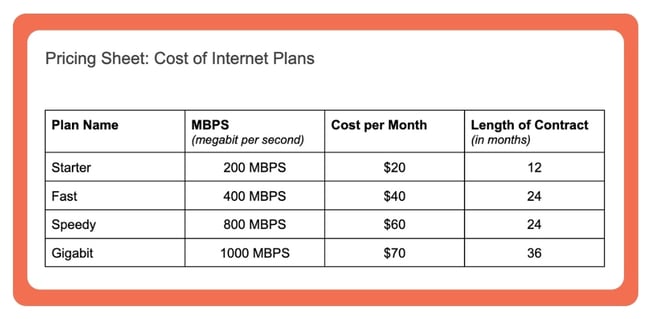 Note: This example was created in Google Docs.
Note: This example was created in Google Docs.
4. Credit union SOP example
Credit unions typically have more than 500 policies and procedures that their entry-level employees need to know. That's complicated! It helps to have all your SOPs documented and easily accessible.
Here is a standard article SOP that gives a general overview of Roth IRA requirements.
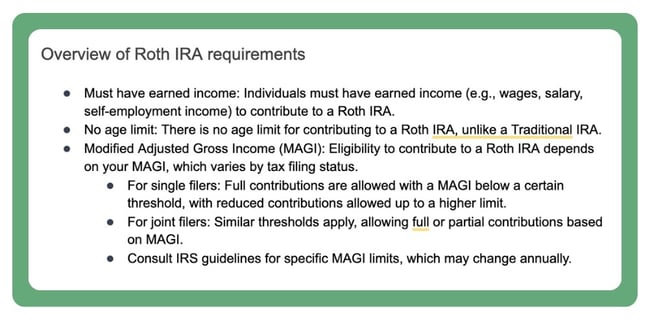 Note: This example was created in Google Docs.
Note: This example was created in Google Docs.
5. Call center SOP example
Call center SOPs are typically call flows or call center scripts. There are a variety of different policies and procedures. Each call center is set up differently. You could have one call center to handle all calls or you may have a call center where there are different departments for different services/products.
Call centers get hundreds of calls every day. For each of those calls, you need an intake flow. This is the script a call center agent would use to answer the phone.
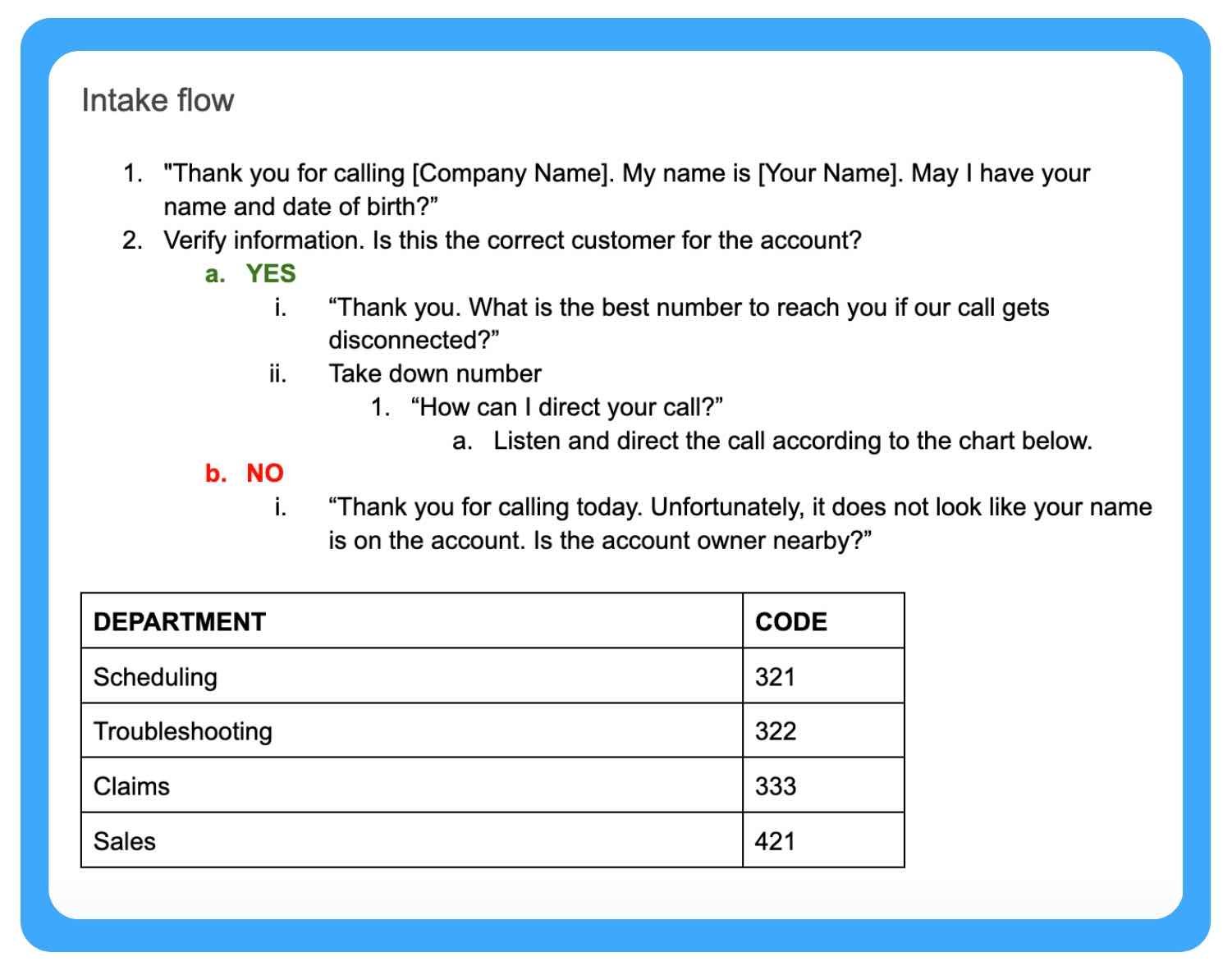 Note: This SOP example was created in Google Docs.
Note: This SOP example was created in Google Docs.
6. Healthcare scheduling SOP example
People are scheduling and changing doctor's appointments every day. That's why many healthcare services use BPOs to schedule their business.
This example may seem like a repeat of the call center script, but this example has been adjusted for the needs of a healthcare scheduling service. It is also a decision tree SOP.
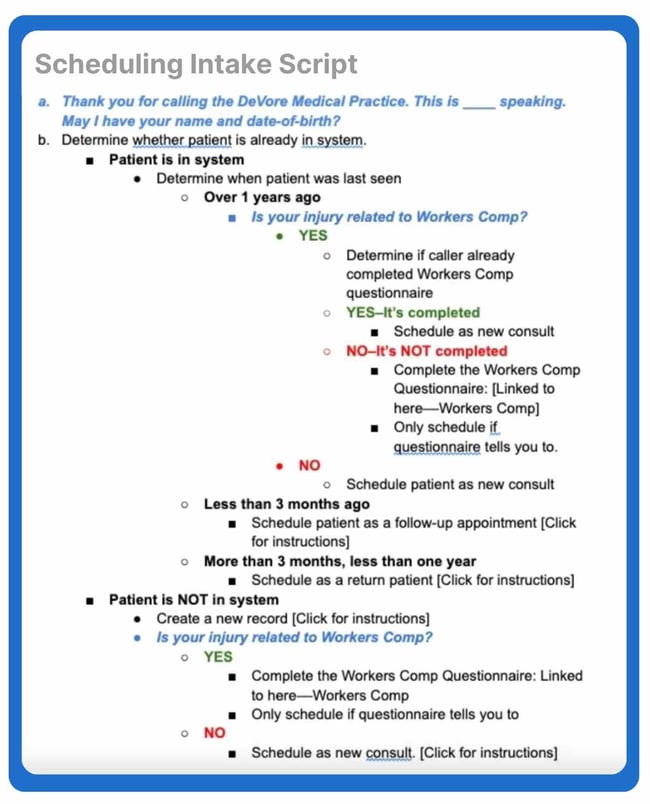 Note: This SOP example was created in Google Docs.
Note: This SOP example was created in Google Docs.
A second SOP that comes in handy if you're in healthcare scheduling is a location reference guide. This reference guide allows someone to quickly skim the available staff, hours, services, etc. at different locations.
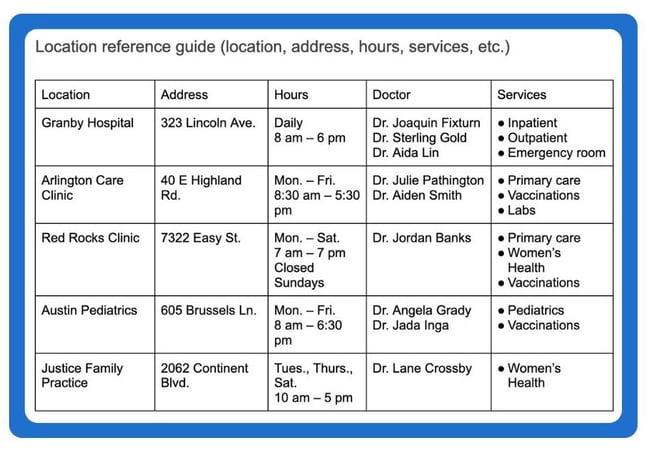 Note: This SOP example was created in Google Docs.
Note: This SOP example was created in Google Docs.
7. Marketing SOP example
Marketing has a variety of different projects and tasks to handle. From running ad campaigns to using different software, you need a bunch of different SOPs for your marketing team to help them work efficiently.
Here is an example of a basic checklist for publishing a blog post. A person using this checklist would need to understand how to use WordPress. This checklist is just a prompt so they don't forget a step.
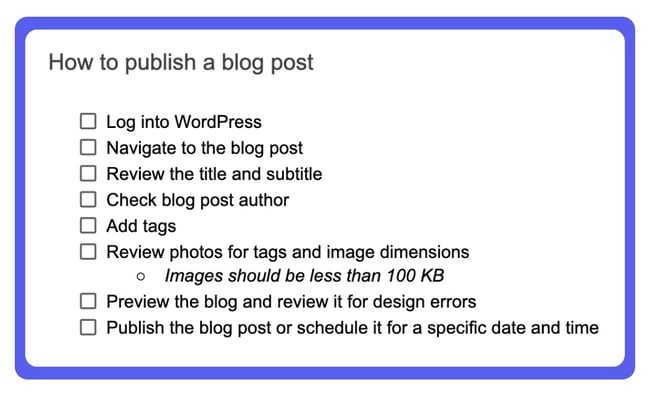 Note: This SOP example was created in Google Docs.
Note: This SOP example was created in Google Docs.
Create your SOPs with easy-to-follow templates for Google Docs and Microsoft Word
When you create SOPs for your business, it is easier for your employees to work independently and to keep the work consistent across your company.
Ultimately, all SOPs come down to the four different types of SOPs listed above. Hopefully, the additional examples help make drafting your SOPs easier.
Want to make writing SOPs even easier?
Download this free SOP template packet. In the packet, you’ll get five different SOP templates for Google Docs or Microsoft Word. You can reformat the templates for whatever platform you need to use them in.




